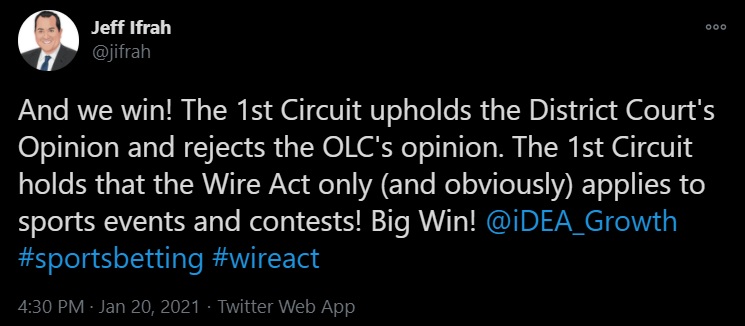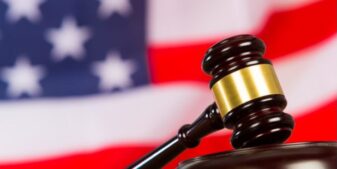The 1961 Wire Act was originally intended to prevent the use of wired telecoms systems to place bets across U.S state-borders and was part of a package of bills enacted to curb the activities of organized crime. when the Internet arrived, the same legal interpretation were deemed to apply to the virtual space too.
This has resulted in a a fragmented iGaming eco-system, with only intrastate gambling allowed in the USA.
Today, the dream of Interstate poker in the USA has moved closer to becoming reality following a momentous victory for U.S poker players after the First Circuit Court Of Appeals Rules Favorably for the ruled in favor of the New Hampshire Lottery Commission’s case against the US Department of Justice (DOJ) regarding the Hampshire lottery commissions 2018 opinion on the Wire Act.
Attorney Jeff Ifrah who is involved in the case as council for IDEA Growth (an association of iGaming operators) tweeted “The 1st Circuit upholds the District Court’s Opinion and rejects the OLC’s opinion. The 1st Circuit holds that the Wire Act only (and obviously) applies to sports events and contests! Big Win!”

This confirmation to uphold of the decision of a lower court on the matter and to rule in favor of the plaintiff affirms that that the DOJ’s new interpretation of the law is not valid.
IDEA Growth issued a statement following the ruling.
“This landmark decision is a victory for states’ rights; for clear reading of federal statutes, and for the gaming industry and its customers”…”Uncertainty surrounding the ambit of the Wire Act has been a cloud over the internet gaming industry since 2018. Today’s decision will hopefully put to rest the question of whether federal law prohibits states from licensing internet gaming within their borders and compacting with each other to allow such gaming on an interstate basis”.
In 2011, in response to an inquiry from two states, the Office of Legal Counsel (OLC) of the DOJ undertook a review of the Criminal Division’s interpretation of the Wire Act. After considering the findings of the courts, the context in which the statute was enacted and the plain language of the statute, the Obama-era OLC concluded that the Wire Act only applied to sports betting. In response to this, several states enacted legislation to license internet gaming operators in their state, while other states began selling lottery tickets on-line.
However, in 2018, the Trump Administration DOJ had the OLC revisit the 2011 guidance, resulting in a new opinion maintaining that the Wire Act prohibited all betting over the internet.
“The 2018 OLC opinion was a blow to states that had chosen to act pursuant to the 2011 OLC opinion, and to the reputation of the OLC as an objective, apolitical arbiter of law for the federal government,” said Ifrah. “Fortunately, most of the gaming industry and the state lotteries came together to challenge that poorly-reasoned opinion.”
In 2018, the New Hampshire Lottery and its partner NeoPollard filed suit against DOJ in the District of New Hampshire. On behalf of the internet gaming industry, IDEA Growth joined the suit as an intervenor. On June 3, 2019, the District Court issued its opinion in New Hampshire Lottery et a. v. Barr finding that the Wire Act applied only to sports betting and striking down the 2018 OLC opinion.
“DOJ doesn’t often lose litigation over the meaning of federal statutes”..”However, the OLC’s 2018 opinion was so misguided that the court resoundingly rejected it.”
On December 20, 2019, DOJ filed an appeal of the District Court’s decision to the First Circuit Court of Appeals. IDEA Growth again intervened in a successful effort to persuade the First Circuit to uphold the District Court’s finding.
“Today’s landmark ruling brings us closer to long-overdue clarity as to the legality of state-licensed internet gaming,” said Ifrah. “Like nearly every other industry, the gaming industry must embrace the internet to engage today’s customers and to thrive in the economy of the future.”
